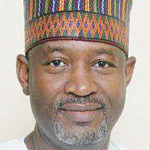NCC, FRC Partner To Strengthen Corporate Governance Compliance in Telecom Sector
EVC, NCC Umar Danbatta
The Nigerian Communications Commission (NCC) and Financial Reporting Council of Nigeria (FRC) say they will partner to strengthen corporate governance compliance in the telecommunications sector.
Mr Sunday Dare, NCC’s Executive Commissioner, Stakeholder Management made this known in a statement on Thursday in Abuja.
Dare was speaking during a courtesy visit by the Management and Board of FRC to the commission in Abuja.
Dare who received the FRC team on behalf of the Executive Vice Chairman of the Commission, Prof. Umar Danbatta said that the commission was ready to provide its full support by working with the council to entrench the best corporate governance practices in all sectors of the Nigerian economy.
He said NCC believes that sound corporate governance was significant for meaningful growth and economic development.
“Particularly for an industry as dynamic and complicated as telecoms. This was why the NCC issued the Code of Corporate Governance for telecom industry in 2014 and made it mandatory for its larger licensees in 2016.”
He noted that the FRC also launched the Nigerian Code of Corporate Governance in 2018 to achieve the same objectives as the NCC Code on an economy-wide basis and that the FRC Code, however, takes effect from January 2020.
Dare explained that while the two codes have the same primary objectives of enhancing corporate performance through adherence to best practice principles, it is natural that there would be areas of divergence.
He noted that the commission and FRC can work together to address the issue for the overall benefit of the country.
“It is our understanding that the National Code will exist simultaneously with sectoral Codes such as the NCC Code. Which will now be described as ‘Guidelines’; where conflicts exist between the two Codes, the stricter provisions will apply; and the National Code by FRC gives flexibility for sector regulators such as the NCC to adapt Governance Principles to suit the peculiar needs of the sector,” he said.
Dare further explained that regulatory certainty and predictability are very critical for the telecoms industry and therefore require continuous and harmonious engagements between the two organisations to address grey areas.
“It is, therefore, necessary that NCC and FRC hold discussions such as this to harmonise positions and agree on key issues such as the seamless operation/implementation of the Codes; issues of enforcement of the Codes;
“Collaborations between the NCC and the FRC on governance issues generally with particular focus on monitoring, review and stakeholder enlightenment as well as a process for dealing with other issues that may arise from time-to-time,” he said.
He also informed the FRC delegation that since the compliance with NCC Code became mandatory, the level of corporate governance compliance among affected telecoms licensees has also increased.
Responding, FRC Executive Secretary, Mr Daniel Asapokhai, commended the NCC for its sectoral code initiative.
Asapokhai said that increased engagement of the businesses and licensees affected by such code must be strengthened.
According to him, “While we have the national Code, having sectoral code is also recognised.
“We only need to work harmoniously to collectively achieve our objective of ensuring that more Nigerian businesses survive by making them more resilient through corporate governance codes and ensure that we make our economy more attractive to investors; as such, we need to collaborate more as organisations.” (NAN)








